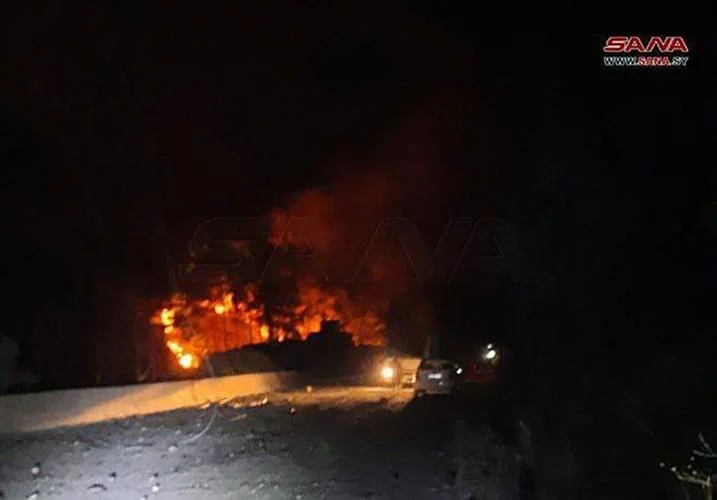Airstrikes Target Suspected Chemical Weapons Facility in Syria, Reports Claim
3 min read

On Sunday night, airstrikes hit a facility in central Syria that Western nations have accused of producing chemical weapons, according to local reports. The strikes, which are suspected to have been conducted by Israel, resulted in at least 18 deaths and 37 injuries, as reported by Syria’s state-run news agency, SANA. The attacks were concentrated in the central regions of Tartous and Hama, including the Masyaf area.
A resident of Masyaf, speaking anonymously for safety reasons, described hearing multiple explosions late into the night. The witness recounted, “About half an hour before midnight, several airstrikes hit the Syrian Military Scientific Studies and Research Center (SSRC) and adjacent buildings. I heard at least eight explosions, followed by the sound of ambulances.”
The SSRC has been a point of contention for years. In 2017, Western governments imposed sanctions on several SSRC officials, accusing them of involvement in the production and deployment of sarin gas, a deadly chemical agent. This followed a sarin attack on Khan Sheikhoun in northwest Syria, which led to international condemnation.
After the initial strikes, the Masyaf resident reported hearing additional explosions. Neighbors indicated that at least four civilians, including three family members, were killed. The local authorities in Hama, led by Dr. Maher Al-Younes, confirmed that the attacks resulted in 16 deaths and 36 injuries, with six individuals in critical condition. SANA added that some of the missiles were intercepted by Syrian air defenses.
The strikes reportedly caused significant damage to the Wadi al-Uyun highway and ignited a fire that firefighters are still working to control. The Syrian military has claimed that the airstrikes were launched from northwest Lebanon, targeting several military sites in central Syria.
Western intelligence agencies have previously alleged that the SSRC facility near Masyaf was used to produce chemical weapons, which would be a violation of the Chemical Weapons Convention. In 2017, the U.S. Treasury Department sanctioned 271 SSRC employees, citing their roles in Syria’s chemical weapons program since at least 2012. The Syrian government has consistently denied these allegations.
The facility was also reportedly targeted by an Israeli strike in September 2017, just a day after a chemical attack on a rebel-held town in northern Syria, attributed to the Syrian air force by the UN and the Organization for the Prohibition of Chemical Weapons (OPCW).
Benny Gantz, Israel’s defense minister in 2022, claimed that under the direction of Qasem Soleimani, Iran had transformed the SSRC into a production site for advanced missiles and other strategic weapons supplied to Hezbollah and Iranian proxies. Gantz labeled Masyaf as a significant threat, emphasizing that the site was used for producing advanced missiles. The facility has been targeted multiple times by the Israeli Air Force.
Israel’s airstrikes in Syria have become more frequent following the escalation of conflict in October 2023, when Hamas launched attacks on Israel, leading to a war with Gaza. This conflict has intensified tensions in the region, resulting in daily exchanges of fire between Israel and Hezbollah along the Israeli-Lebanese border.
Hezbollah, which has been actively involved in Syria since the 2011 Arab Spring, has supported the Assad regime and fought alongside Iran-aligned forces. The group’s strong presence in Syria has contributed to the ongoing regional instability.
Recent Israeli operations include a June airstrike near Aleppo that reportedly killed an Iranian military adviser and an April bombing of Iran’s embassy complex in Syria, which heightened the risk of a larger confrontation between Iran and Israel.
The situation in Syria remains volatile, with ongoing airstrikes and military engagements reflecting the broader regional conflicts and geopolitical rivalries at play.